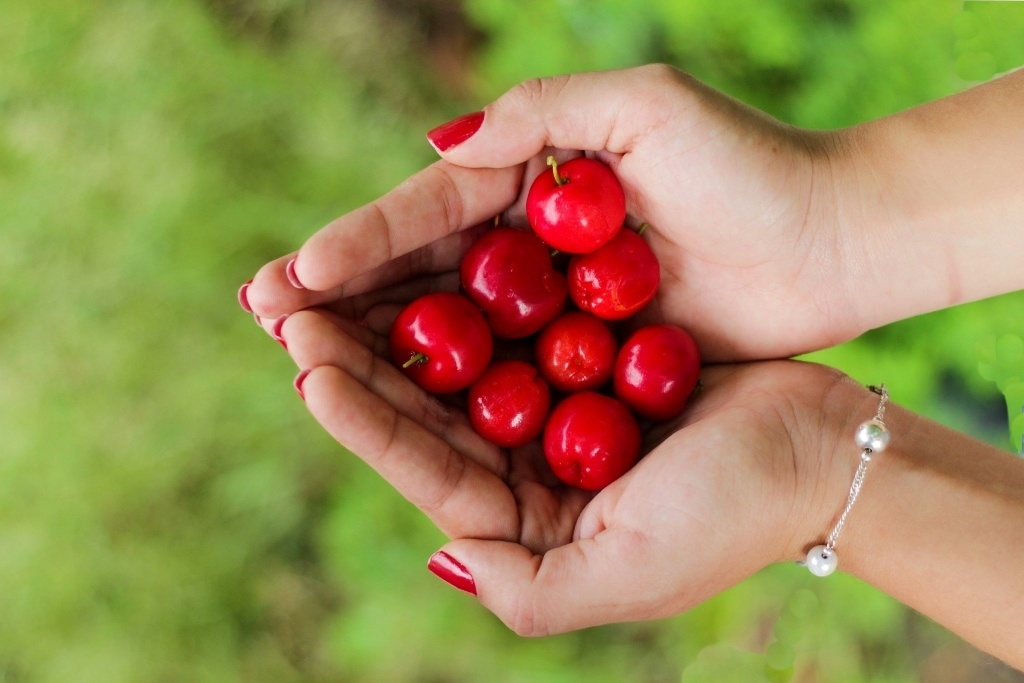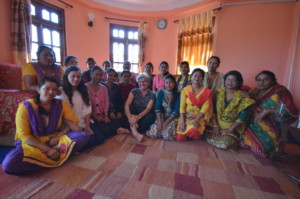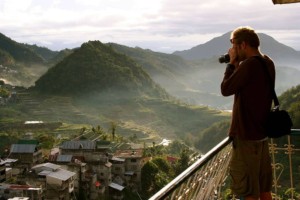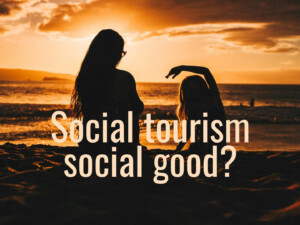Is agritourism a more eco-friendly & gender-equitable form of tourism?

Would you pay more for cherries you picked yourself? Respondents in an agritourism study by Erdogan Koc said they would. In this “Good Tourism” Insight, his second, Prof Koc summarises the case for agritourism and its potential benefits for the environment and women … and cherry growers.
In parallel with its fast growth over the past two decades, tourism has begun to present major environmental and sustainability problems.1, 2 Indeed it is one of the major causes of pollution in China.3
Many researchers have suggested that mass tourism has several sustainability problems and risks relating to both the physical and social environments.4, 5, 6 Meanwhile, other researchers show that tourists, including package tourists,11 are increasingly becoming interested in sustainability.7, 8, 9, 10
Sustainability issues relating to tourism are not limited to the natural environment alone. Research shows that female employment in tourism and hospitality is both vertically and horizontally segregated.12 In tourism and hospitality, women often tend to find employment in subordinate posts with low incomes and limited opportunities for upward mobility.13, 14, 15 Women often work as receptionists, waitresses, room attendants, cleaners, travel agents, while men at similar levels of employment are usually employed as barmen, porters, gardeners, maintenance staff, etc.12
Also see Hartman, Nguyễn, and Võ’s “GT” Insight
“How can vocational education contribute to women’s empowerment?”
All of the above suggests that there is a need for more sustainable and equitable tourism and hospitality products.16
Several studies show that agritourism is a more environmentally-friendly form of tourism.17, 18, 19, 20 Also, research suggests that opportunities provided in agritourism may help reduce gender discrimination in the sector as a whole.9, 20, 21, 22
As agritourism allows tourists to engage in outdoor activities, spend quality time with family, and purchase and consume fresher foods,23, 24 it may be increasingly preferred as a tourism activity.12 Likewise, as agritourism activities comprise a range of exploratory day trip experiences, tourists may tend to visit farms more often than they engage in traditional forms of tourism activity.25 This means that agritourism has a relatively higher growth potential compared with mass tourism.
Also see Peter Semone’s “GT” Insight
“Rural tourism: Delighting tourists, developing communities”
A study by my colleagues and I earlier this year showed that customer participation in agritourism with a choice of activities increased customer satisfaction and loyalty.20 More importantly, the choice created an illusion of decisional control and resulted in the further positive evaluation of their overall experiences.
Tourists in the study evaluated the cherries they picked at a cherry farm more positively than the cherries picked by staff at the very same farm. They were prepared to pay 72% more for the cherries they themselves picked.
What do you think? Share a short anecdote or comment below. Or write a deeper “GT” Insight. The “Good Tourism” Blog welcomes diversity of opinion and perspective about travel & tourism because travel & tourism is everyone’s business.
Featured image (top of post): Picking cherries. By Free-Photos (CC0) via Pixabay.
Click here for the full list of references
About the author

Erdogan Koc is a professor of services marketing and management in the Faculty of Economics, Administrative and Social Sciences, Department of Business Administration at Bahcesehir University, Istanbul, Turkey.
A specialist in the marketing and management of tourism and hospitality services, Prof Koc has written several books. His most recent is Cross-Cultural Aspects of Tourism and Hospitality: A Services Marketing and Management Perspective.
Prof Koc’s scholarly papers have been published in leading journals including Tourism Management, Journal of Travel and Tourism Marketing, Journal of Hospitality Marketing and Management, Annals of Tourism Research, International Journal of Intercultural Relations, Total Quality Management and Business Excellence, International Journal of Human Resource Management, and Journal of Gastronomy and Tourism.
He serves on the editorial boards of several journals including Journal of Hospitality Marketing and Management, International Journal of Intercultural Relations, International Journal of Hospitality and Tourism Administration, Journal of Promotion Management, Young Consumers, Journal of Hospitality and Tourism Insights, Journal of Hospitality, and Journal of Tourism Quarterly.
References
- Bressan, A., & Pedrini, M. (2020). “Exploring sustainable-oriented innovation within micro and small tourism firms”, Tourism Planning & Development, 17(5), 497 – 514.
- Sun, Q., & Liu, Z. (2020). “Impact of tourism activities on water pollution in the West Lake Basin (Hangzhou, China)”, Open Geosciences, 12(1), 1302 – 1308.
[^ return to article]
- Qiu, X.; Fang, Y.; Yang, X.; Zhu, F. (2017). “Tourism eco-efficiency measurement, characteristics, and its influence factors in China”, Sustainability 9, 1634.
[^ return to article]
- Higgins-Desbiolles, F., Carnicelli, S., Krolikowski, C., Wijesinghe, G., & Boluk, K. (2019). “Degrowing tourism: Rethinking tourism”, Journal of Sustainable Tourism, 27(12), 1926 – 1944.
- Lu, J., & Nepal, S. K. (2009). “Sustainable tourism research: An analysis of papers published in the Journal of Sustainable Tourism”, Journal of sustainable Tourism, 17(1), 5 – 16.
- Mitrică, B., Şerban, P. R., Mocanu, I., Damian, N., Grigorescu, I., Dumitraşcu, M., & Dumitrică, C. (2021). “Developing an Indicator-Based Framework to Measure Sustainable Tourism in Romania. A Territorial Approach”, Sustainability, 13(5), 2649.
[^ return to article]
- Buffa, F. (2015). “Young tourists and sustainability. Profiles, attitudes, and implications for destination strategies”, Sustainability 7, no. 10: 14042 – 14062.
- Kastenholz, E., Eusebio, C., & Carneiro, M. J. (2018). “Segmenting the rural tourist market by sustainable travel behaviour: Insights from village visitors in Portugal”, Journal of Destination Marketing & Management, 10, 132 – 142.
- Koc, E. (2020a). Cross-cultural Aspects of Tourism and Hospitality: A Services Marketing and Management Perspective. Routledge.
- Jiménez-García, M., Ruiz-Chico, J., Peña-Sánchez, A. R., & López-Sánchez, J. A. (2020). “A bibliometric analysis of sports tourism and sustainability (2002 – 2019)”, Sustainability, 12(7), 2840.
[^ return to article]
- Goffi, G., Cladera, M., & Pencarelli, T. (2019). “Does sustainability matter to package tourists? The case of large-scale coastal tourism”, International Journal of Tourism Research, 21(4), 544 – 559.
[^ return to article]
- Koc, E. (2020b). “Do women make better in tourism and hospitality? A conceptual review from a customer satisfaction and service quality perspective”, Journal of Quality Assurance in Hospitality & Tourism, 21(4), 402 – 429.
[^ return to article]
- Kogovsek, M., & Kogovsek, M. (2015). “Hospitality and tourism gender issues remain unsolved: A call for research”, Quaestus, (6), 194.
- Carvalho, I., Costa, C., Lykke, N., Torres, A., & Wahl, A. (2018). “Women at the top of tourism organizations: Views from the glass roof”, Journal of Human Resources in Hospitality & Tourism, 1 – 26.
- Remington, J., & Kitterlin-Lynch, M. (2018). “Still pounding on the glass ceiling: A study of female leaders in hospitality, travel, and tourism management”, Journal of Human Resources in Hospitality & Tourism, 17(1), 22 – 37.
[^ return to article]
- Paunović, I., Dressler, M., Mamula Nikolić, T., & Popović Pantić, S. (2020). “Developing a competitive and sustainable destination of the future: Clusters and predictors of successful national-level destination governance across destination life-cycle”, Sustainability, 12(10), 4066.
[^ return to article]
- Mastronardi, L., Giaccio, V., Giannelli, A., & Scardera, A. (2015). “Is agritourism eco-friendly? A comparison between agritourism and other farms in Italy using farm accountancy data network dataset”, SpringerPlus, 4(1), 1 – 12.
- Shen, Ching-Cheng, Yen-Rung Chang, and Der-Jen Liu. “Rural Tourism and Environmental Sustainability — A Study on a Model for Assessing the Developmental Potential of Organic Agritourism”, Sustainability 12, no. 22 (2020): 9642.
- Tseng, M. L., Chang, C. H., Wu, K. J., Lin, C. W. R., Kalnaovkul, B., & Tan, R. R. (2019). “Sustainable agritourism in Thailand: Modeling business performance and environmental sustainability under uncertainty”, Sustainability, 11(15), 4087.
- Koc, E., Boz, H. and Boz, B. (2021). “Sustainability Implications of Agrotourism”, Unpublished Working Paper. Bahcesehir University, Istanbul, Turkey.
[^ return to article]
- Boley, B. B., Ayscue, E., Maruyama, N., & Woosnam, K. M. (2017). “Gender and empowerment: Assessing discrepancies using the resident empowerment through tourism scale”, Journal of Sustainable Tourism, 25(1), 113 – 129.
- Savage, A. E., Barbieri, C., & Jakes, S. (2020). “Cultivating success: personal, family and societal attributes affecting women in agritourism”, Journal of Sustainable Tourism, 1 – 21.
[^ return to article]
- Lusk, Jayson L. “External validity of the food values scale”, Food Quality and Preference 22, no. 5 (2011): 452 – 462.
- Lusk, Jayson L. “Income and (Ir) rational food choice”, Journal of Economic Behavior & Organization 166 (2019): 630 – 645.
[^ return to article]
- Chikuta, O., & Makacha, C. (2016). “Agritourism: A possible alternative to Zimbabwe’s tourism product”, Journal of Tourism and Hospitality Management, 4(3), 103 – 113.
[^ return to article]





